
Saltwater pools have become increasingly popular as more people discover their numerous benefits. In fact, Saltwater pool systems account for over 70% of all new pool installations in the United States.
One reason for their popularity is that saltwater pools are considered a more natural and eco-friendly option than traditional chlorine pools. They use salt as the primary sanitizing agent, a naturally occurring substance in seawater. This means that the water in a saltwater pool is gentler on the skin and eyes and less likely to cause irritation.
Saltwater pools offer a more comfortable and enjoyable swimming experience due to the softer water texture and lack of strong chemical smell. This can make swimming more appealing to those who might have been put off by the harsh chemicals and irritants associated with traditional chlorine pools.
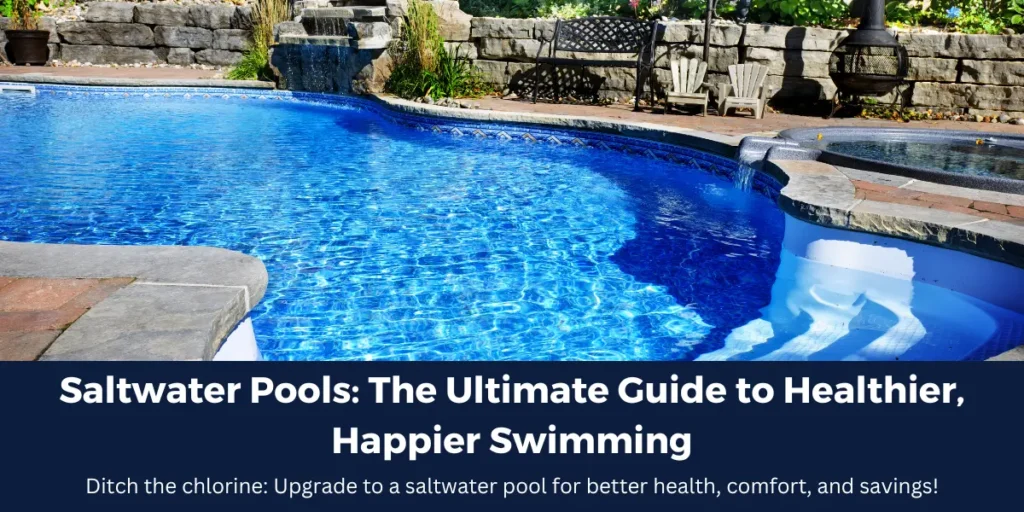
A saltwater pool is a type of swimming pool that uses a saltwater chlorination system to keep the water clean and clear. Unlike traditional chlorine pools, which require the addition of chemicals such as liquid chlorine or chlorine tablets to sanitize the water, saltwater pools use a salt cell to convert salt into chlorine.
One of the benefits of saltwater pools is that they are gentler on the skin and eyes compared to traditional chlorine pools. This is because the water in a saltwater pool contains lower levels of chlorine and fewer harsh chemicals. As a result, swimmers are less likely to experience skin irritation, red eyes, or a strong chlorine smell.
Let’s discuss about the key differences between saltwater pools and traditional chlorine pools.
One of the most significant differences is how the water is sanitized. Traditional chlorine pools require chemicals such as liquid chlorine or chlorine tablets, whereas the saltwater pool contains way less chlorine generated through the filter system.
Saltwater pools offer numerous advantages over traditional chlorine pools, making them a preferred choice among smart pool owners. They offer a more comfortable, cost-effective, and low-maintenance swimming experience than traditional chlorine pools.
Saltwater pools typically require less maintenance than traditional chlorine pools. This is because the saltwater chlorination system produces chlorine as needed, so there is no need to manually add chlorine to the pool.
Also, saltwater pools tend to have fewer issues with algae growth and pH imbalances, meaning less money is spent on chemicals and maintenance.
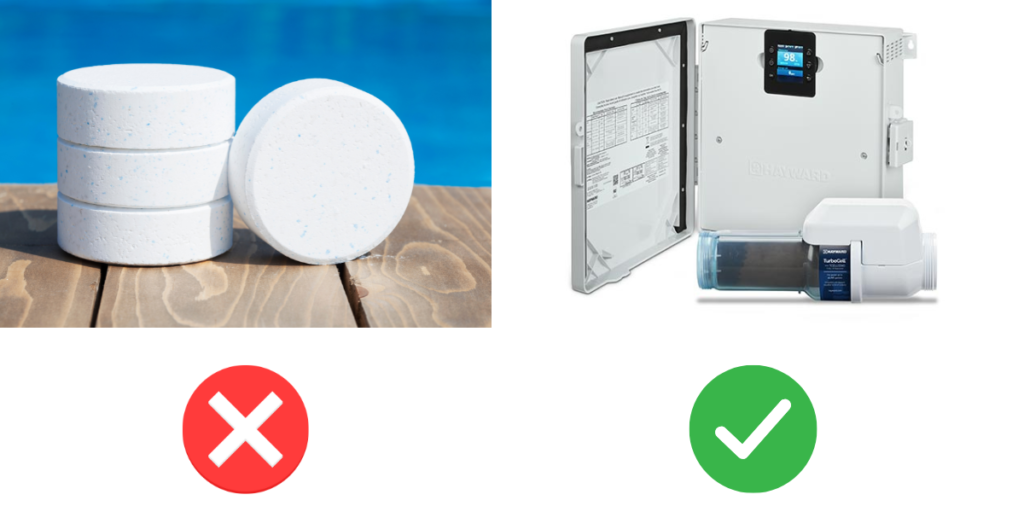
Saltwater pools offer several benefits over traditional chlorine pools. They are better for your health, more cost-effective in the long run, require less maintenance, and provide a more comfortable swimming experience.
Additionally, with no need to store chlorine, they are safer for you and your family.
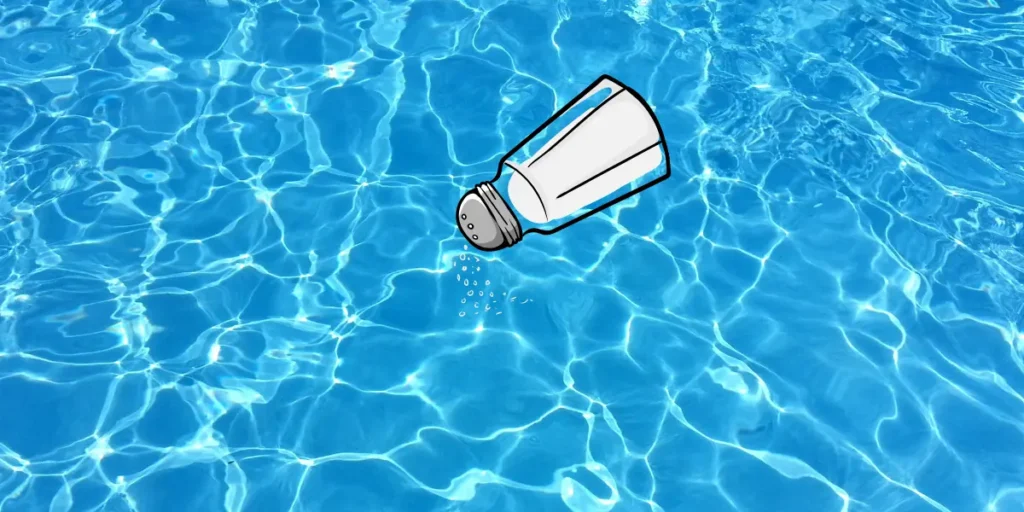
While saltwater pools require less maintenance than traditional chlorine pools, they still need some upkeep to ensure the water remains clean and safe for swimming. One of the main differences between the maintenance requirements of saltwater pools and traditional chlorine pools is the need to check and adjust the salinity level in a saltwater pool.
In addition to salinity levels, regular maintenance tasks for saltwater pools include:
The frequency of these tasks will depend on the size of the pool, the number of swimmers, and other factors, but generally, saltwater pools require less maintenance than traditional chlorine pools.
Comparing the maintenance requirements of saltwater pools and traditional chlorine pools, it’s clear that saltwater pools require less effort and time to maintain. With a conventional chlorine pool, you must constantly check and adjust the chlorine levels, add chlorine tablets or powder, and shock the pool regularly to keep it clean and safe. In contrast, saltwater pools create their own chlorine through the electrolysis process, so there is no need to manually add chlorine.
Overall, the maintenance requirements of a saltwater pool are more straightforward and less time-consuming than those of a traditional chlorine pool.
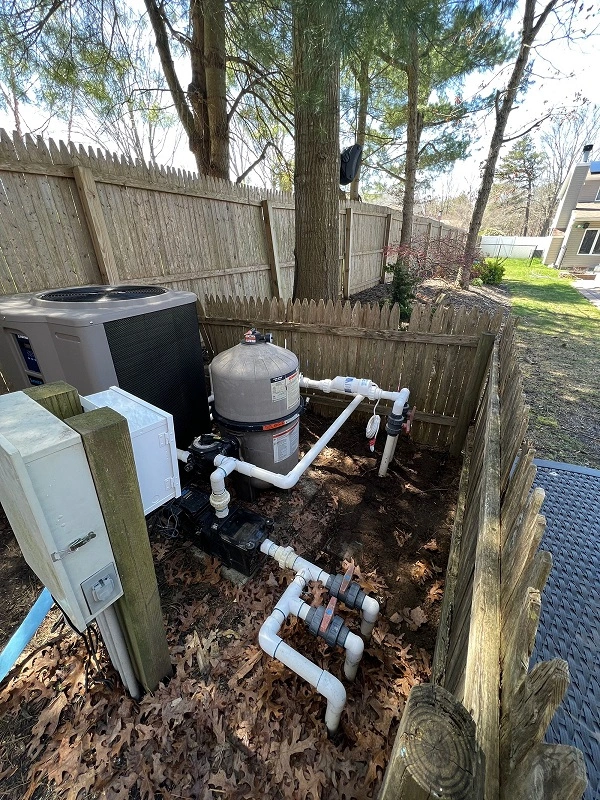
Installation and upgrading to a saltwater pool is a wise investment and more accessible than you might think. If you’re considering a saltwater pool, there are a few things to consider, such as the installation process and cost.
Firstly, let’s look at the installation process for a saltwater pool. It involves installing a saltwater chlorinator, which generates chlorine from the saltwater. The chlorinator must be connected to the pool pump, filter, and plumbing. The salt is added to the pool, and the chlorinator converts it into chlorine. The process is straightforward and typically takes only a few hours to complete.
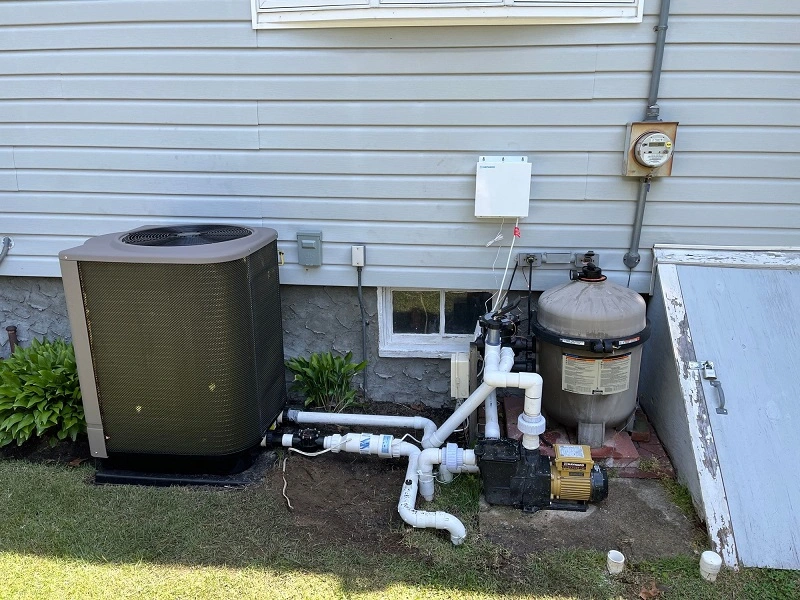
Hayward Saltwater System
Now let’s talk about the cost of installation and upgrading to a saltwater pool. The cost varies depending on the pool size, the type of equipment used, and the complexity of the installation. A rough estimate is anywhere from $2,000 to $4,000 to convert your pool into a saltwater pool. The long-term benefits and savings on maintenance costs make it a worthwhile investment.
Romanelli Pools has highly experienced technicians for saltwater pool installations and upgrades. We have the expertise and experience to ensure a seamless installation process, providing the peace of mind that comes with knowing your investment is in good hands. Get in touch with us now!
When it comes to saltwater pool systems, Hayward is known as the best in the industry. Hayward salt systems are reliable, efficient, and require minimal maintenance. The systems use a patented Turbo Cell technology, which provides optimal performance and extends the system’s lifespan.
Overall, investing in a saltwater pool with Romanelli Pools and Hayward salt systems is an intelligent decision that provides numerous benefits and long-term savings.
Saltwater pools are gaining popularity, and many pool owners have questions about how they work and how to maintain them. Here are some of the most frequently asked questions about saltwater pools:
Q: Are saltwater pools completely chlorine-free?
A: No, saltwater pools use electrolysis to create chlorine via the saltwater passing the electronically charged plates to disinfect the water. However, chlorine levels in a saltwater pool are much lower than in a traditional chlorine pool.
Q: Is installing a saltwater pool more expensive than a traditional chlorine pool?
A: Yes, the initial cost of installing a saltwater pool is higher than a traditional chlorine pool due to the cost of the saltwater chlorination system. However, over time, the lower maintenance costs of a saltwater pool can make up for the initial investment.
Q: Do I need to add salt to my saltwater pool regularly?
A: Yes, occasionally, you may need to add salt to your pool to maintain the proper levels. However, the levels of salt in a saltwater pool are much lower than the salt levels in ocean water.
Q: How often do I need to test the water in a saltwater pool?
A: You should test the water in your saltwater pool at least once a week during the swimming season to ensure proper water balance and chlorination levels. You can use test strips or a digital testing kit to test the water (or sign up for one of our weekly maintenance plans!).
Q: Can I convert my existing chlorine pool to a saltwater pool?
A: It is possible to convert a traditional chlorine pool to a saltwater pool. However, it is essential to consult with a pool professional to determine the best way to do so and to ensure that your pool is compatible with a saltwater system.
Q: Can I swim in a saltwater pool with sensitive skin?
A: Saltwater pools are generally better for people with sensitive skin and allergies than traditional chlorine pools. The lower chlorine levels in a saltwater pool can help reduce skin and eye irritation.
Saltwater pools are becoming increasingly popular for many reasons. They are better for your health, require lower maintenance costs, and offer softer and more comfortable water for an enhanced swimming experience. Saltwater pools are also environmentally friendly as they reduce the use of harsh chemicals and do not produce harmful byproducts.
If you are considering upgrading your traditional chlorine pool to a saltwater pool, Romanelli Pools is the expert in installation and upgrades. We can guide you through the installation process and provide you with the best options for Hayward salt systems, known as the best in the industry for saltwater pool systems.
While the initial cost of installation and upgrading to a saltwater pool may be higher, the long-term benefits outweigh the cost. Saltwater pools require less maintenance, which saves you time and money in the long run. Moreover, there is no need to store chlorine, which could be a harmful thing to do.
In conclusion, saltwater pools offer numerous benefits over traditional chlorine pools. They are a better choice for your health, your long-term finances, and comfort. If you are considering upgrading to a saltwater system, Romanelli Pools can provide the best guidance and options for your specific needs. Upgrade your pool to a saltwater system and enjoy the benefits of crystal-clear water and a more luxurious swimming experience.

We make pool ownership easy with stress-free maintenance, expert repairs, and cutting-edge tech. From sparkling water to pool automation, we handle every detail so you can relax and enjoy your pool.
© 2025 Paul Romanelli & Son Pool Service.